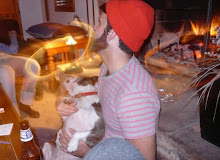
Bibio is Stephen Wilkinson, a young composer, producer, and folk auteur from Black Country central England. He has a new record on Mush, called Vignetting the Compost. In it he seems to be splitting time between field recording bugs, winds, lake shores, and all manner of small flapping things, and pillaging Incredible String Band recordings. It's a lovely lofi wistful piece of artifice the affect of which is not unlike that of The Books, where existential innuendo and aimless nostalgia are housed in the body of a wizened old twanger. That said, Bibio's got his own, blissed out but hyper musical persona. If I ever did take a fishing trip with my grandfather in central England (supposedly the source of the name Bibio comes from a fishing lure his grandfather used to make), I would hope the soundtrack would be like this. That said, I can only imaginatively entertain this mythologized scenario for so long. Sometimes it begins to look plainly old fashioned. Take the excessive reversing of waveforms for example (i.e. where a sound is heard backwards). It's not that the reference to 60's experimental psychedelia is a problem, it's just that it's used so frequently and in such obvious contexts (strings, guitars) that it starts to sound like a crutch.
Or take some of the tracks with vocals ("Great are the Piths", "Mr. and Mrs. Compost"); it's fine to emulate the tone of Art Garfunkel, but don't act like that correlates with how memorable a melody is. The tracks with vocals also in a way give the lie to the majority of the album that doesn't have lyrics. Why didn't he write vocal parts for every song? Are the songs with vocals meant to be centerpieces, or at least bear more weight, and if so, why do the vocal parts sound so much like an afterthought? One of my composition teachers always said that no matter what, when a human voice is introduced into a piece of music, it will be the center of gravity for every other moment or element in the rest of the piece. Its absence, even, should be defined not as the moment where the voice stops and the instruments continue, but where we begin to wait for the voice to return. Bibio treats voices like just another patch of color in a delicately sewn quilt, or a reference point to an indefinite past. It's not someone singing, it's the memory of what it sounds like when someone sings. This self-referentiality is attractive in the way that vanitas stlye still life is; it cooly offers up a tangible vision of life which is actually hypostatizing as a vision of the inevitability of death. This is ultimately corrosive of Bibio's true aim, which is not to revisit something that has died and lies curdled in our memory but to re-envision it as a fruit on the vine (at least if I am to believe the album art). There are moments on this record that spring with this in mind, such as the lilting "Weekend Wildfire", the haunting "Under the Pier", or the playful "Doppleton". But there is such a wealth of decomposing items, awaiting their rebirth in fresh soil, that the record becomes mildly creepy, and not in a good way, smelling of mothballs before it had even been worn.






No comments:
Post a Comment